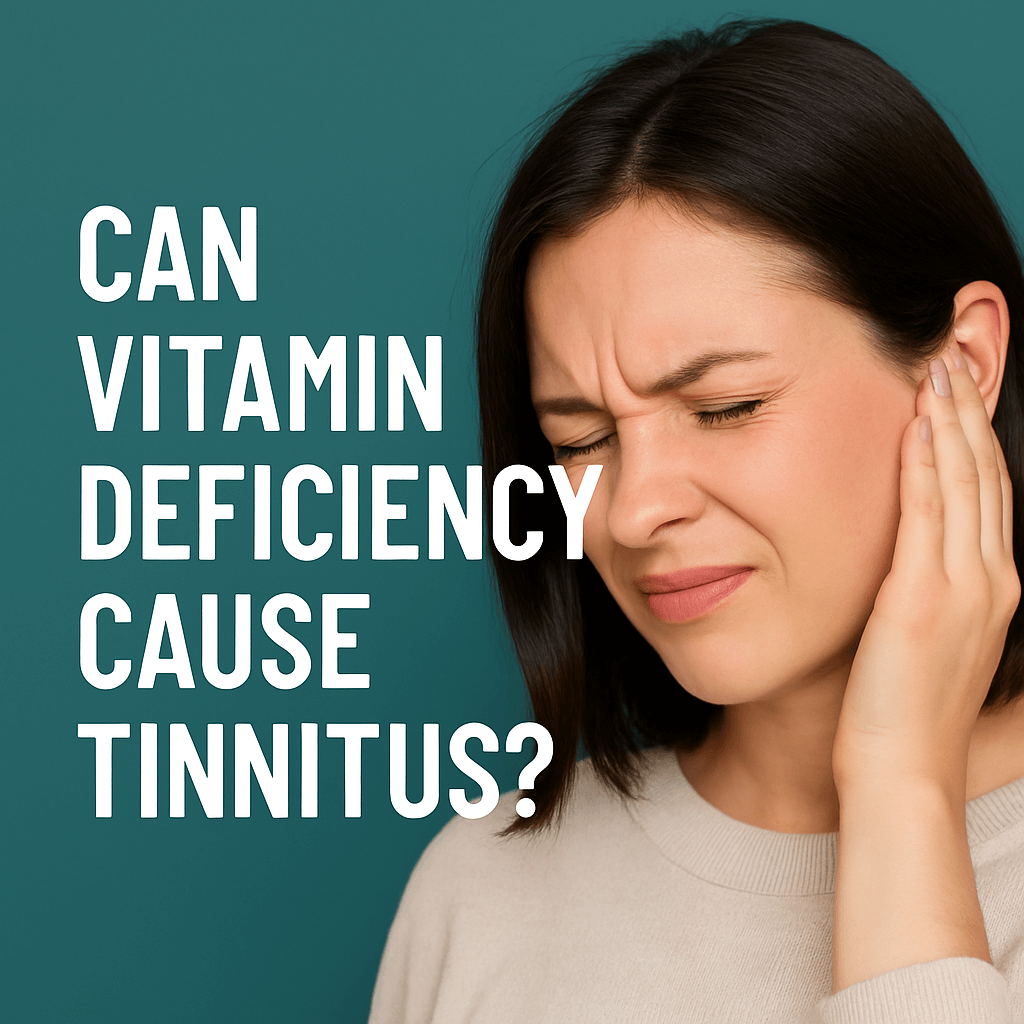This article contains affiliate links. If you purchase through these links, we may earn a commission at no extra cost to you. Full disclosure
Tired, foggy, and can’t shake that ringing in your ears? Your nutrient levels might be the missing piece. Vitamins like B12, D, magnesium, and zinc all play critical roles in keeping your auditory system balanced - and when they run low, your ears often pay first.
When these nutrients are deficient, nerve signals become erratic, the cochlea gets less oxygen, and the brain may misinterpret silence as noise. A study in the National Library of Medicine found a clear link between B12 deficiency and tinnitus in people exposed to noise trauma.
📋 Our Research-Backed Recommendation
After reviewing the research on tinnitus and auditory health, this supplement combines clinically-studied ingredients that target the mechanisms discussed above. Backed by a 60-day money-back guarantee.
*Affiliate link - we may earn a commission at no cost to you. Full disclosure
Key Deficiencies Linked to Tinnitus
- Vitamin B12 - nerve insulation + sound processing. Deficiency causes nerve damage, buzzing, fatigue.
- Vitamin D - calcium balance + cochlear health. Low levels linked to inflammation and sound sensitivity.
- Magnesium - nerve calming + circulation. Deficiency causes noise sensitivity and stress spikes.
- Zinc - antioxidant support for ear cells. Low zinc linked to poor recovery and immune imbalance.
These deficiencies often overlap with brain fog, fatigue, and anxiety - and may be the missing link to improving your tinnitus relief.
Get Weekly Health Tips
Join thousands getting evidence-based wellness insights delivered free every week.
🔒 No spam. Unsubscribe anytime.
Signs You Might Be Deficient

Nutrient deficiencies rarely happen in isolation. Look beyond your ears for these patterns:
- Frequent fatigue or brain fog
- Tingling in hands or feet (B12)
- Poor sleep or anxiety (Magnesium, B6)
- Light or sound sensitivity (Zinc, D)
- Muscle cramps or twitching (Magnesium)
- Low mood or irritability (Vitamin D, B-complex)
If these show up alongside tinnitus, nutrient support is worth exploring.
What the Research Says
In the American Journal of Otolaryngology, patients with noise-induced tinnitus were significantly more likely to have B12 deficiency. After supplementing, many experienced measurable improvement in severity. Additional findings:
- Magnesium reduces stress-induced auditory overactivity
- Vitamin D regulates inflammation and inner ear function
- Zinc supports cochlear health and cell regeneration
Best Forms and Food Sources

The form matters as much as the dose. Poorly absorbed supplements won’t help:
🧪 What Our Research Points To
After analyzing the studies and mechanisms discussed above, one natural supplement formulation stands out for its evidence-based approach to auditory health and tinnitus management.
- Clinically-studied ingredients targeting auditory nerve health
- Dosages aligned with published research
- 60-day money-back guarantee - zero risk to try
See Full Ingredient Breakdown →
No subscription required · Affiliate disclosure
Supplement Forms
- B12 (Methylcobalamin) - highly bioavailable, active in the nervous system
- Vitamin D3 - better absorbed and longer-lasting than D2
- Magnesium Glycinate - gentle, calming for the nervous system
- Zinc Picolinate - easily absorbed, ideal for immune and ear tissue support
Food Sources
- B12: eggs, fish, meat, nutritional yeast
- D: fatty fish, egg yolks, sun exposure
- Magnesium: pumpkin seeds, spinach, avocado
- Zinc: shellfish, legumes, seeds, nuts
FAQ: Vitamin Deficiencies and Tinnitus
Can vitamin deficiency cause tinnitus?
Yes. B12, D, magnesium, and zinc deficiencies disrupt nerve signaling, increase inflammation, and impair inner ear function - all common tinnitus triggers.
Which vitamin matters most for tinnitus?
B12 is considered most critical because it directly supports nerve insulation and auditory signaling. Vitamin D and magnesium also play key roles.
Can vitamins alone fix tinnitus?
Not always - but correcting deficiencies often reduces ringing intensity and improves stress response.
How long before supplements help?
Most people notice subtle improvements in 2-4 weeks, with deeper results over 6-8 weeks of consistent use.
About Us: The YWHL Editorial Team researches health, wellness, and nutrition topics by analyzing published studies and clinical data. Our goal is to help readers make informed decisions about their health. This content is for educational purposes only - always consult your healthcare provider before starting any supplement or health program.
Some of the links on this site are affiliate links, which means we may earn a commission if you click through and make a purchase, at no additional cost to you. None of the information in this blog is medical advice. It is simply for educational purposes only.
📚 Research Sources
⭐ Struggling with Tinnitus?
Discover evidence-based approaches and natural supplements that may help manage tinnitus symptoms and support auditory health.
*Individual results may vary. This site contains affiliate links.

